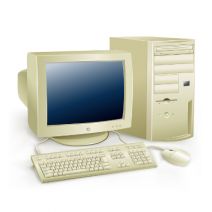 There’s no denying that computers have become a central figure in the rapid growth and success of Western culture. With it brings commentary. In the second half of the 20th century and the first decade-and-a-half of the 21st century, humans have turned to the motion picture to tell the stories they deem important and noteworthy. The growth of technology has not only presented us with our new lifestyle, it has virtually erased the lifestyle of our ancestors, and this revelation leads to fear.
There’s no denying that computers have become a central figure in the rapid growth and success of Western culture. With it brings commentary. In the second half of the 20th century and the first decade-and-a-half of the 21st century, humans have turned to the motion picture to tell the stories they deem important and noteworthy. The growth of technology has not only presented us with our new lifestyle, it has virtually erased the lifestyle of our ancestors, and this revelation leads to fear.
Directive Blogs
It’s a technology-driven world. We are surrounded by technology all the time, and some people literally couldn’t do what they do without it. More than would admit, anyway. So with all this technology all over the place, are we happier? This is a big question. Far bigger than we have time for in this blog, but we thought we would unpack the question a little bit and discuss some elements of this new technology-run society that can give us some insight into people’s feelings.
There is a microprocessor shortage influencing all kinds of businesses around the globe, and it’s only going to get worse following the Russian invasion of Ukraine. Ukraine produces somewhere between 45 and 54 percent of the world’s semiconductor-grade neon, something which is absolutely crucial to the creation of microchips. The invasion has put a halt to neon-refinement companies Ingas and Cryoin, and as you can imagine, this puts a massive strain on an already struggling supply chain.
Your business relies on mission-critical hardware that keeps its infrastructure running, including servers, workstations, and networking components. However, these pieces of technology require maintenance in order to function properly, and replacement every so often to keep the risk of downtime and hardware failure to a minimum. Thankfully, modern managed IT services have yielded a solution to this issue that can make managing your hardware infrastructure as easy as possible: Hardware as a Service.
 When you call tech support, you’re probably going to get the same response every single time: “Have you tried turning it off and on again?” There’s a reason that this happens so often, and it’s because restarting your computer is a great, low-tech way to resolve some basic issues with your system. However, it’s still good to be cautious about more serious issues that a reboot won't fix. We’ll walk you through what a reboot does, and it can be effective at fixing minor issues with your PC.
When you call tech support, you’re probably going to get the same response every single time: “Have you tried turning it off and on again?” There’s a reason that this happens so often, and it’s because restarting your computer is a great, low-tech way to resolve some basic issues with your system. However, it’s still good to be cautious about more serious issues that a reboot won't fix. We’ll walk you through what a reboot does, and it can be effective at fixing minor issues with your PC.
 With as many resources as you’ve invested in your company’s technology, you should do everything you can to protect it. An IT infrastructure that doesn’t have an Uninterruptible Power Supply (UPS) safeguarding its data, is putting the entire operation at risk. Here’s what you need to know about this important device.
With as many resources as you’ve invested in your company’s technology, you should do everything you can to protect it. An IT infrastructure that doesn’t have an Uninterruptible Power Supply (UPS) safeguarding its data, is putting the entire operation at risk. Here’s what you need to know about this important device.
 It’s a known fact that technology doesn’t last forever. In fact, technology grows at such an astounding rate that some users often feel the need to replace their devices the second a bigger and better tech is launched. What if this unprecedented growth and increase in reliability become a hindrance to the sales of PC manufacturers?
It’s a known fact that technology doesn’t last forever. In fact, technology grows at such an astounding rate that some users often feel the need to replace their devices the second a bigger and better tech is launched. What if this unprecedented growth and increase in reliability become a hindrance to the sales of PC manufacturers?
 Early in July, IBM announced that they have developed an ultra-dense computer chip that has roughly four times the computing capacity of today’s most powerful chips. These prototype chips, and ones they will develop to fuel computing into the next decade and beyond, are the result of the evolution of 21st century informatics.
Early in July, IBM announced that they have developed an ultra-dense computer chip that has roughly four times the computing capacity of today’s most powerful chips. These prototype chips, and ones they will develop to fuel computing into the next decade and beyond, are the result of the evolution of 21st century informatics.
 In 1965, the technological landscape was much different from what we see now. The idea of having a small computer in your pocket in the form of a smartphone was but a distant dream. Now, it’s commonplace for all but the youngest of children to have a smartphone. How is this possible? Well, it’s all thanks to Moore’s law, which has led the development of new technology for the past 50 years.
In 1965, the technological landscape was much different from what we see now. The idea of having a small computer in your pocket in the form of a smartphone was but a distant dream. Now, it’s commonplace for all but the youngest of children to have a smartphone. How is this possible? Well, it’s all thanks to Moore’s law, which has led the development of new technology for the past 50 years.


